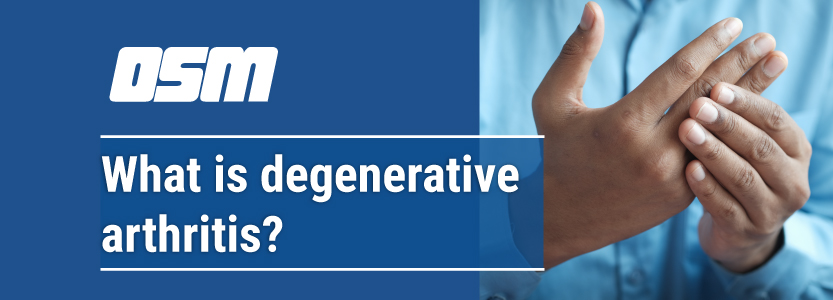What Is Degenerative Arthritis?
Article featured on MedicalNewsToday
Arthritis is an umbrella term for diseases that affect a person’s joints. Degenerative arthritis, also known as osteoarthritis, is a form of arthritis that develops due to aging or overuse.
Degenerative arthritis is the most common form of arthritis in the United States, where more than 32.5 million adults are living with the condition.
It is sometimes known as the “wear and tear” form of arthritis, as it often occurs due to the natural aging process. It can also develop as a result of an injury or the overuse of a particular joint.
In this article, we look at the causes, risk factors, symptoms, diagnosis, and treatment of degenerative arthritis.
Symptoms of degenerative arthritis
The symptoms of degenerative arthritis vary depending on where in the body a person develops the disease. They usually get worse over time rather than occurring suddenly, except in the case of injuries.
Regardless of which parts of the body the condition affects, common symptoms may include:
- pain, often throbbing
- dull aching
- swelling
- reduced flexibility
- clicking or popping noises when a joint bends
- stiffness
- decreased range of motion
Typically, joint stiffness will present early in the morning or after periods of rest, and it will last for up to 30 minutes before loosening up again. The joint pain can either be predictable and low level, lasting for long periods, or take the form of intense unpredictable bursts of pain.
According to the National Institute of Arthritis and Musculoskeletal and Skin Diseases, the parts of the body that OA most often affects include the:
- fingers and thumbs
- knees
- hips
- neck
- lower back
As the condition progresses, people may find themselves unable to complete activities such as holding a coffee pot, going up steps, or walking long distances.
Causes of degenerative arthritis
People develop degenerative arthritis when the joint cartilage between bones becomes damaged or breaks down.
Often, the body activates a repair mechanism to attempt to remedy this damage. As part of this, bone spurs, or osteophytes, may grow within the joint at the end of the bone. These can then cause friction within the joint and lead to pain when the person uses it.
Risk factors
Certain factors may increase a person’s chance of developing degenerative arthritis. These include:
- Age: Symptoms generally appear in adults over the age of 50 years, although they can occur earlier.
- Sex: Females are more likely than males to develop OA.
- Genetics: OA tends to run in families.
- Weight: Having obesity can increase a person’s likelihood of developing OA, as the additional weight can place extra stress on the joints.
- Overuse: Repetitively using the same joints, such as in sports or at work, can sometimes lead people to develop OA.
Some of these risk factors, such as weight, are modifiable, whereas a person cannot change others, such as age and genetics.
Diagnosis of degenerative arthritis
There is no single test to confirm the diagnosis of degenerative arthritis.
Instead, doctors will ask a series of questions about the person’s medical history, such as when the pain began and whether they have sustained any injuries to the affected joint or joints. They may also want to know when the pain occurs and what, if anything, makes it worse.
In addition, the doctor can use X-rays to check for bone spurs or other types of bone damage. They may also take samples of fluid from the joints to rule out infection or gout and run blood tests to exclude other possible causes.
Treatment for degenerative arthritis
Healthcare professionals may treat degenerative arthritis in various ways. Some people with the condition may receive a combination of treatments.
The main aims of treatment include:
- reducing symptoms
- improving joint function
- preventing the condition from progressing further
- maintaining or improving the person’s quality of life
Medications
Doctors prescribe medications to help reduce the pain and inflammation associated with degenerative arthritis.
Medications may include:
- oral pain relievers, such as acetaminophen, or nonsteroidal anti-inflammatory drugs (NSAIDs), such as ibuprofen
- oral anti-inflammatory medications
- corticosteroid injections to relieve inflammation and pain
- topical products, such as creams, sprays, or rubs, to soothe sore joints
Physical therapy
Combining physical therapy with increased activity levels can help a person manage degenerative arthritis symptoms. People should ensure that they only participate in low impact activities to prevent further damage to the joints.
Maintaining an active lifestyle may help by:
- reducing pain
- improving function
- increasing muscle and bone strength
- improving mood
- increasing quality of life
- preventing falls by improving balance
It can also help a person maintain a moderate weight, which experts advise people with OA to try to do.
Surgery
Some people may need surgery if other treatments prove ineffective or the damage to the joint is extensive.
This surgery could be in the form of an osteotomy, during which a surgeon removes or reshapes part of the damaged bone.
Alternatively, a person may have a partial or total joint replacement, which involves a surgeon partially or entirely removing the joint and replacing it with a synthetic one.
Nonmedical options
Maintaining a moderate weight can help remove the added stress that excess body weight can put on the joints. People can do this by following a nutritious, well-balanced diet and engaging in regular, low impact physical activity.
Hot and cold therapies may also help relieve pain and stiffness in the joints. People should alternate the application of hot and cold compresses to the areas over the affected joints.
However, a person should always wrap an ice pack in a cloth first so that they are not applying it directly to their skin.
The Orthopedic & Sports Medicine Center of Oregon is an award-winning, board-certified orthopedic group located in downtown Portland Oregon. We utilize both surgical and nonsurgical means to treat musculoskeletal trauma, spine diseases, sports injuries, degenerative diseases, infections, tumors and congenital disorders.
Our mission is to return our patients back to pain-free mobility and full strength as quickly and painlessly as possible using both surgical and non-surgical orthopedic procedures.
Our expert physicians provide leading-edge, comprehensive care in the diagnosis and treatment of orthopedic conditions, including total joint replacement and sports medicine. We apply the latest state-of-the-art techniques in order to return our patients to their active lifestyle.
If you’re looking for compassionate, expert orthopedic surgeons in Portland Oregon, contact OSM today.
Phone:
503-224-8399
Address
1515 NW 18th Ave, 3rd Floor
Portland, OR 97209
Hours
Monday–Friday




